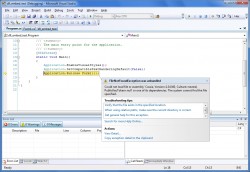JVM Security
Make sure your installation of JVM is up to date. There are some well-known security holes in Microsoft’s JVM that can be exploited by browser hijackers. It helps to replace Microsoft’s JVM with Sun’s official JVM. Version 1.4.2 JRE and Version 1.5.0 JRE are both available for download. The JRE downloads are for everyday users, while the SDK downloads are for Java developers and programmers.
Software Updates & Patches
Make sure to check for updates for security programs (firewalls, spyware removal tools, and AV tools), IE, and Windows often. They usually contain security fixes that would otherwise be open to exploitation.
Use an Alternative Browser
To be concise, avoid using IE. It can be a huge magnet for spyware, adware, malware and various hijacks. Just because IE comes preinstalled on your system, doesn’t mean it has to be used as your primary browser. The reason IE is such a huge magnet is because of its wide user base.
Alternative browsers contain changes in the speed of browsing, caching, and the way image loading is handled, which are also significant advantages over IE, but lack ActiveX support. Opera and Firefox are two of the most popular alternative browsers. As long as IE is not being used, it is a good choice. There are also small number alternative browsers that are based on IE, and often have many of the same security exploits that can be taken advantage of as in IE. They should be avoided. Firefox and Opera are the two major accepted alternative browsers that are available for use. However, a note about firefox: since it is growing in popularity and becoming the second most used browser, it is starting to become a target for adware, spyware and malware. Take a look at this Wired News article for a glimpse at what to expect in the very near future.
Web pages that still use browser recognition scripts will sometimes force you to use IE on their webpage saying something to the effect of “This webpage does not support your browser.” In other instances where there may not be a recognition script, the page will simply appear not to work correctly. In cases like these, yes, you will need to use IE for the time being. Luckily, this does not happen often and many good web designers are moving towards using coding standards, rather than using sloppy browser-specific coding.
Windows Processes
Check up on what is running in the system processes in the task manager (right click on toolbar > Task Manager > “Processes” tab). Pay special attention to executables (*.exe files). If you don’t know what it is, try taking a look at this Startup Database, or this processes library to see if it’s spyware, or a legitimate program or windows process. If it’s not listed, try Googling for the process name.




 AdamTheTech.com and respective content is Copyright 2003-2025.
AdamTheTech.com and respective content is Copyright 2003-2025.